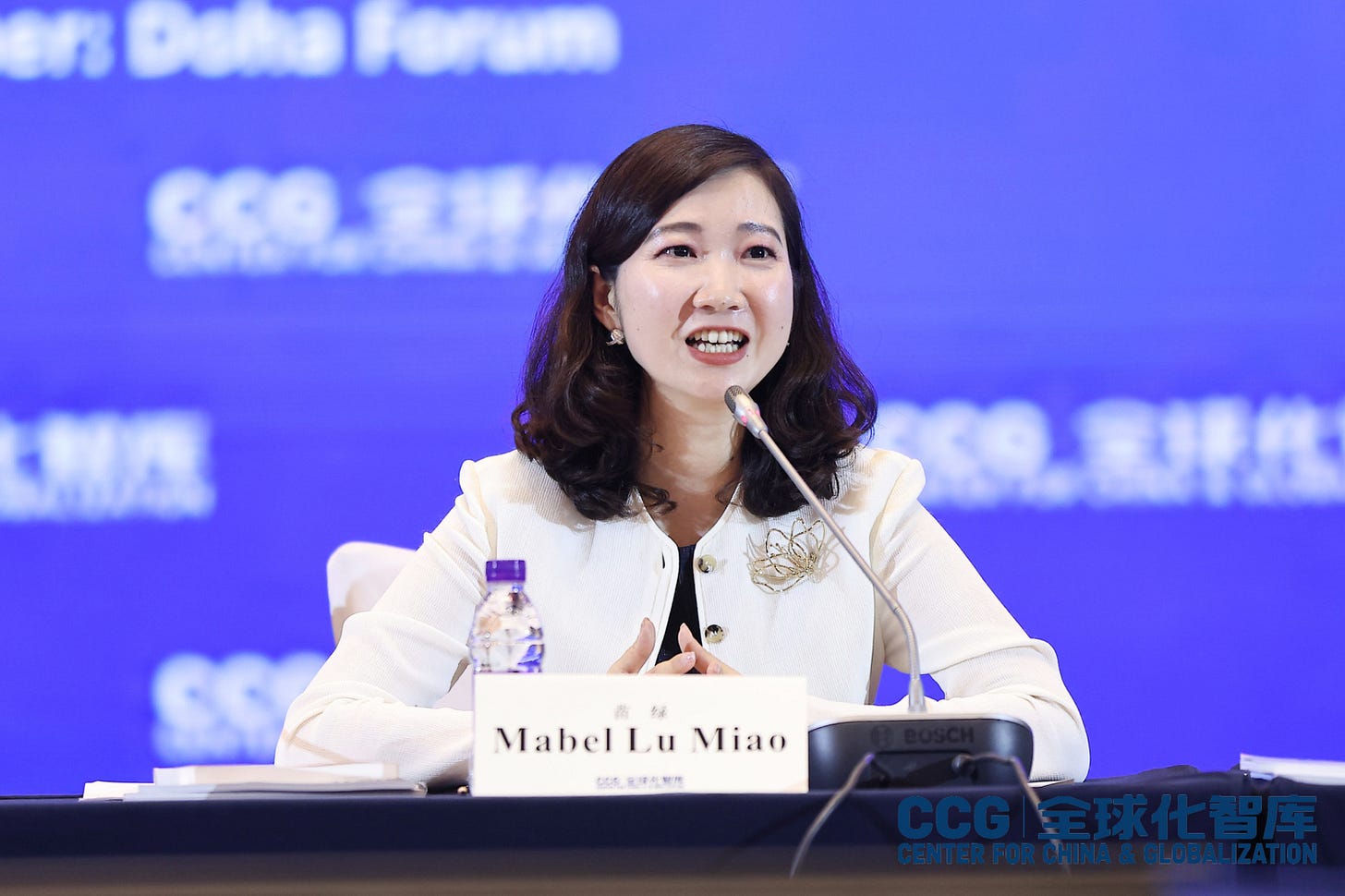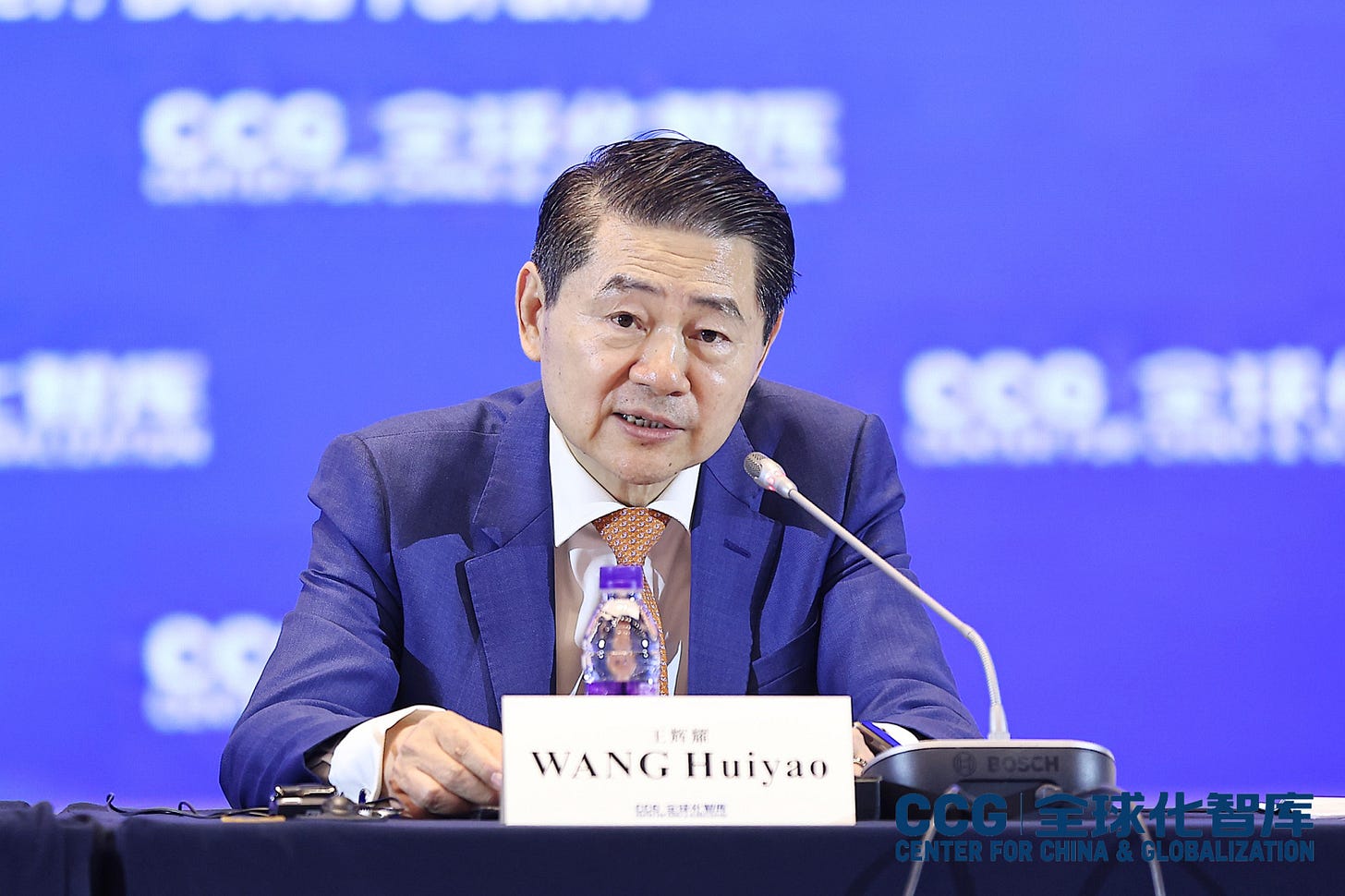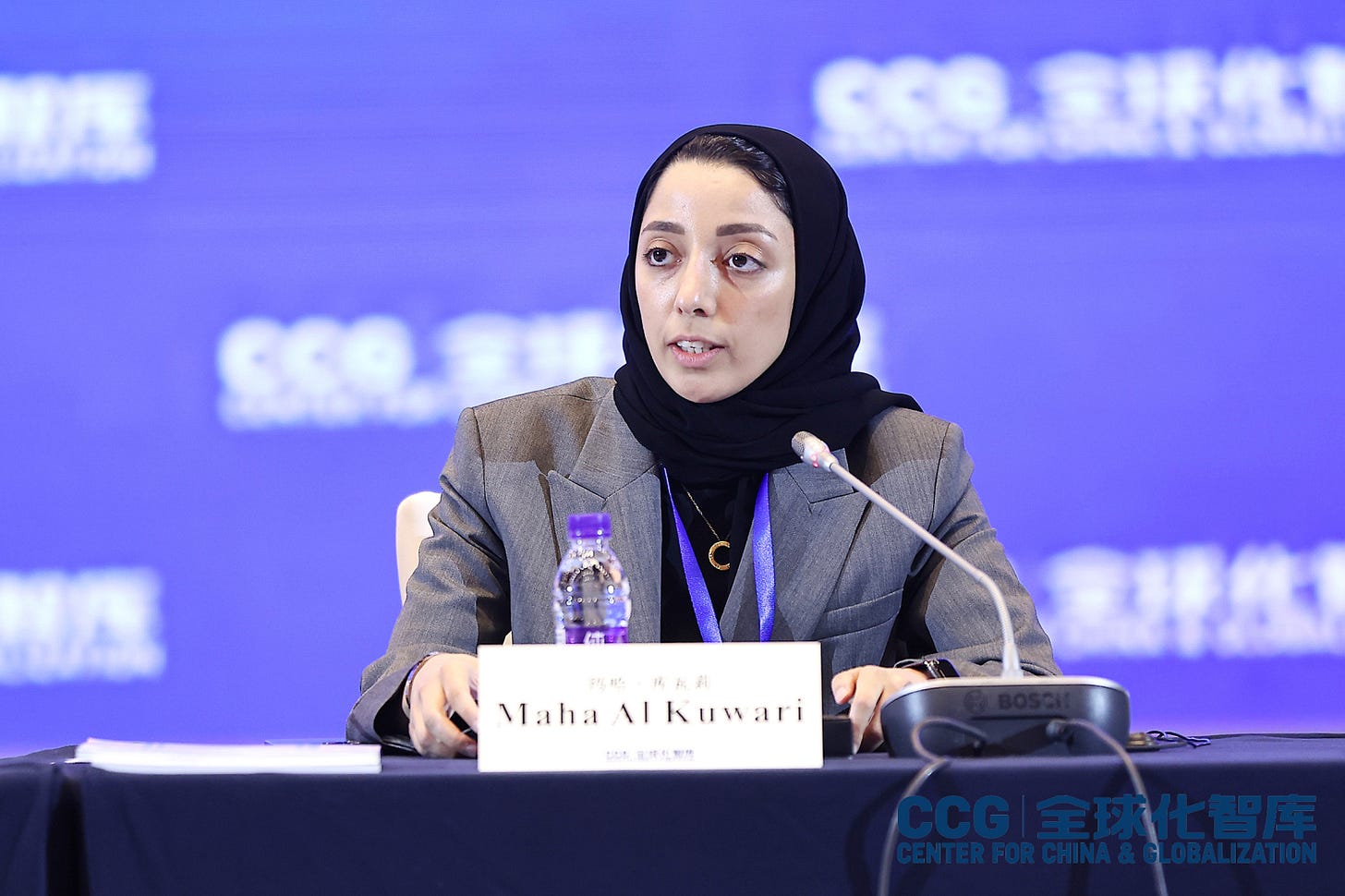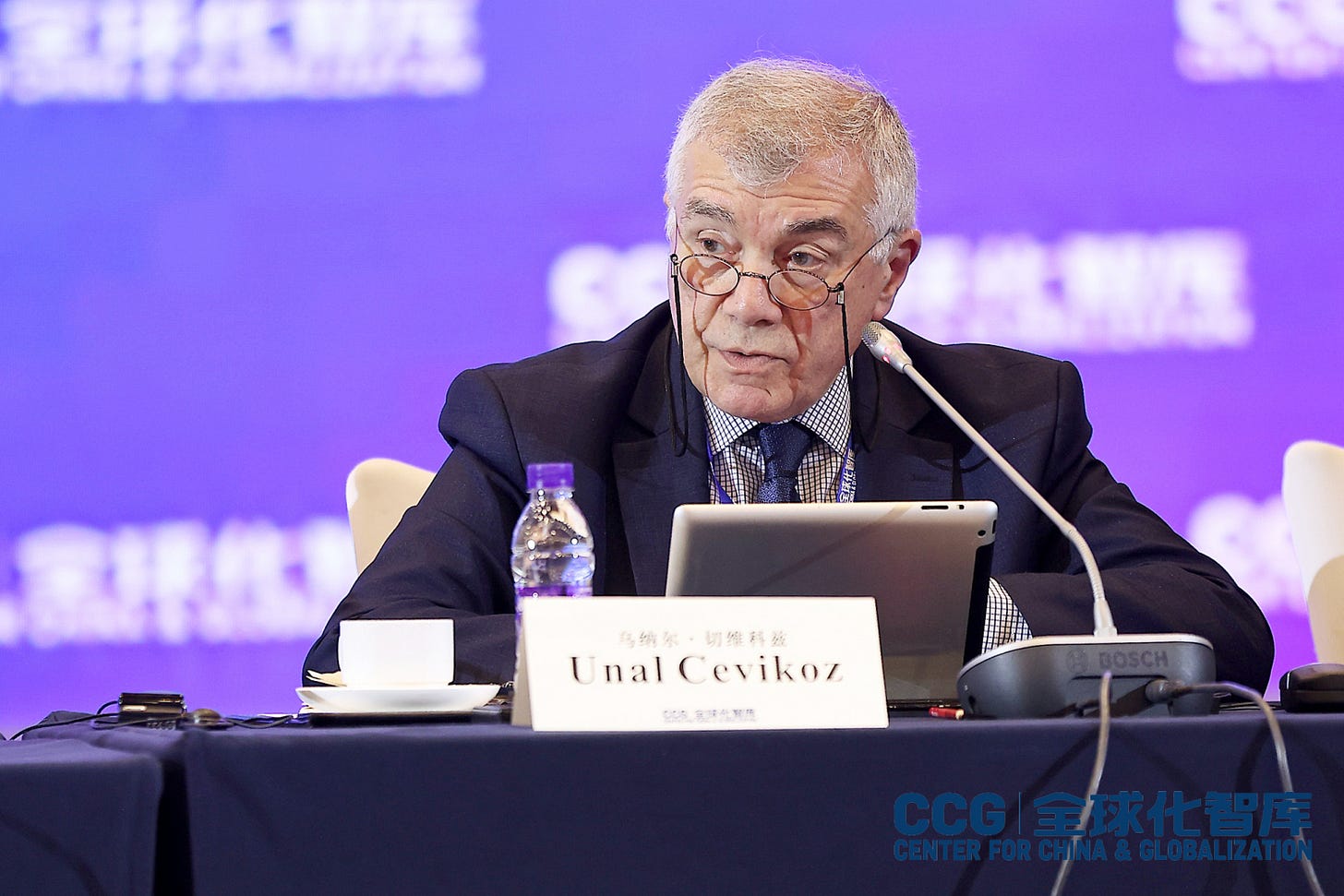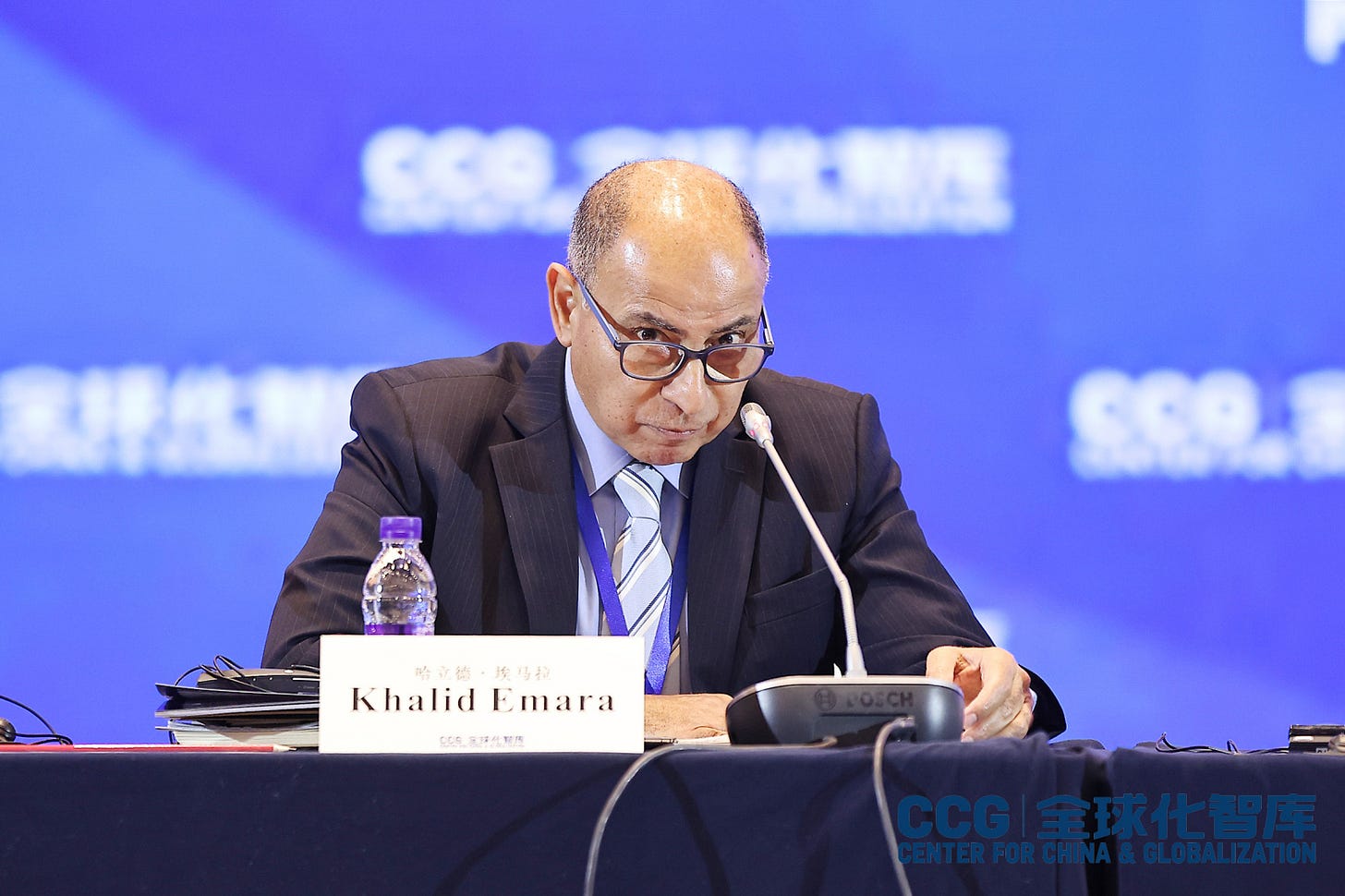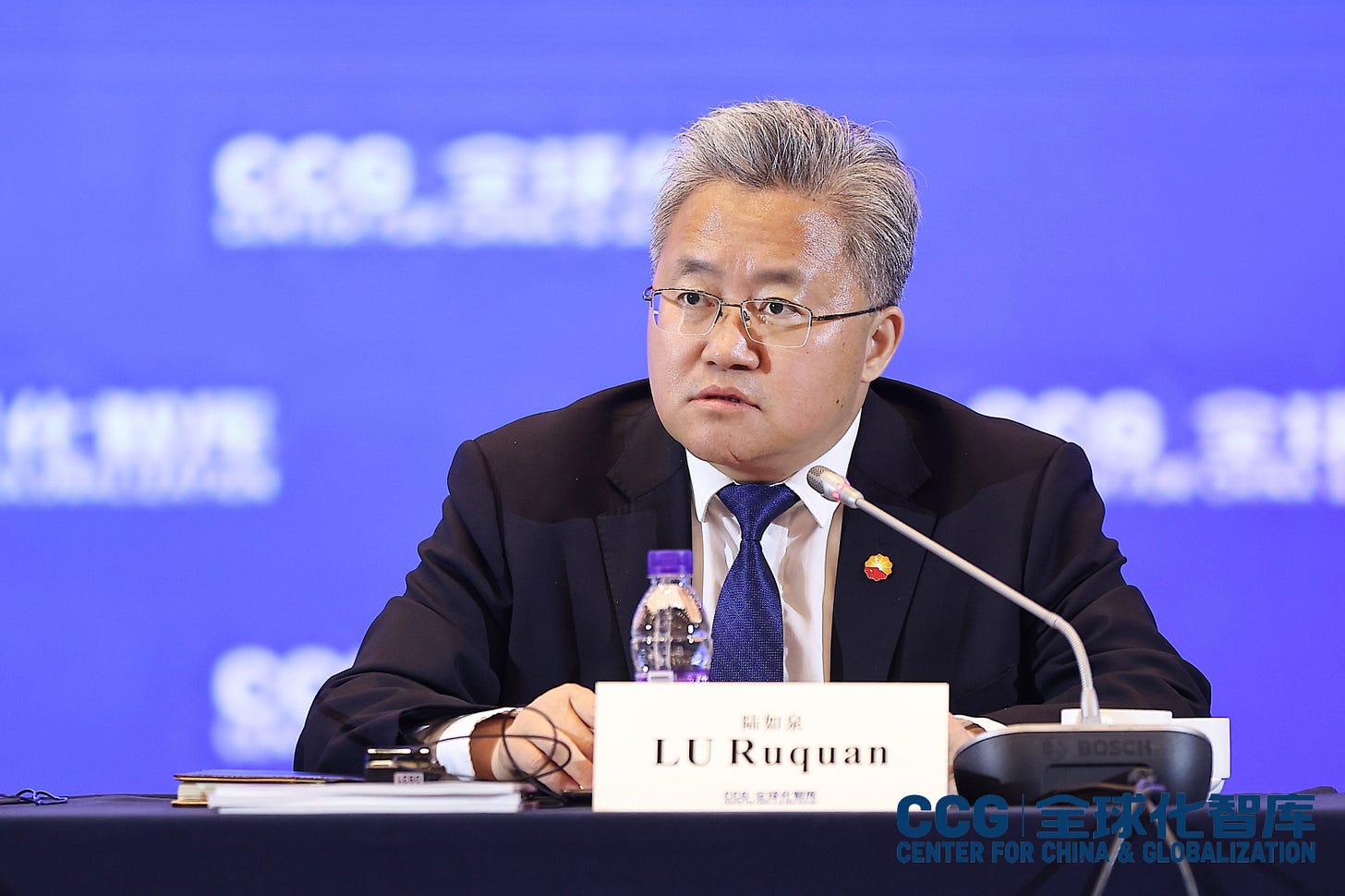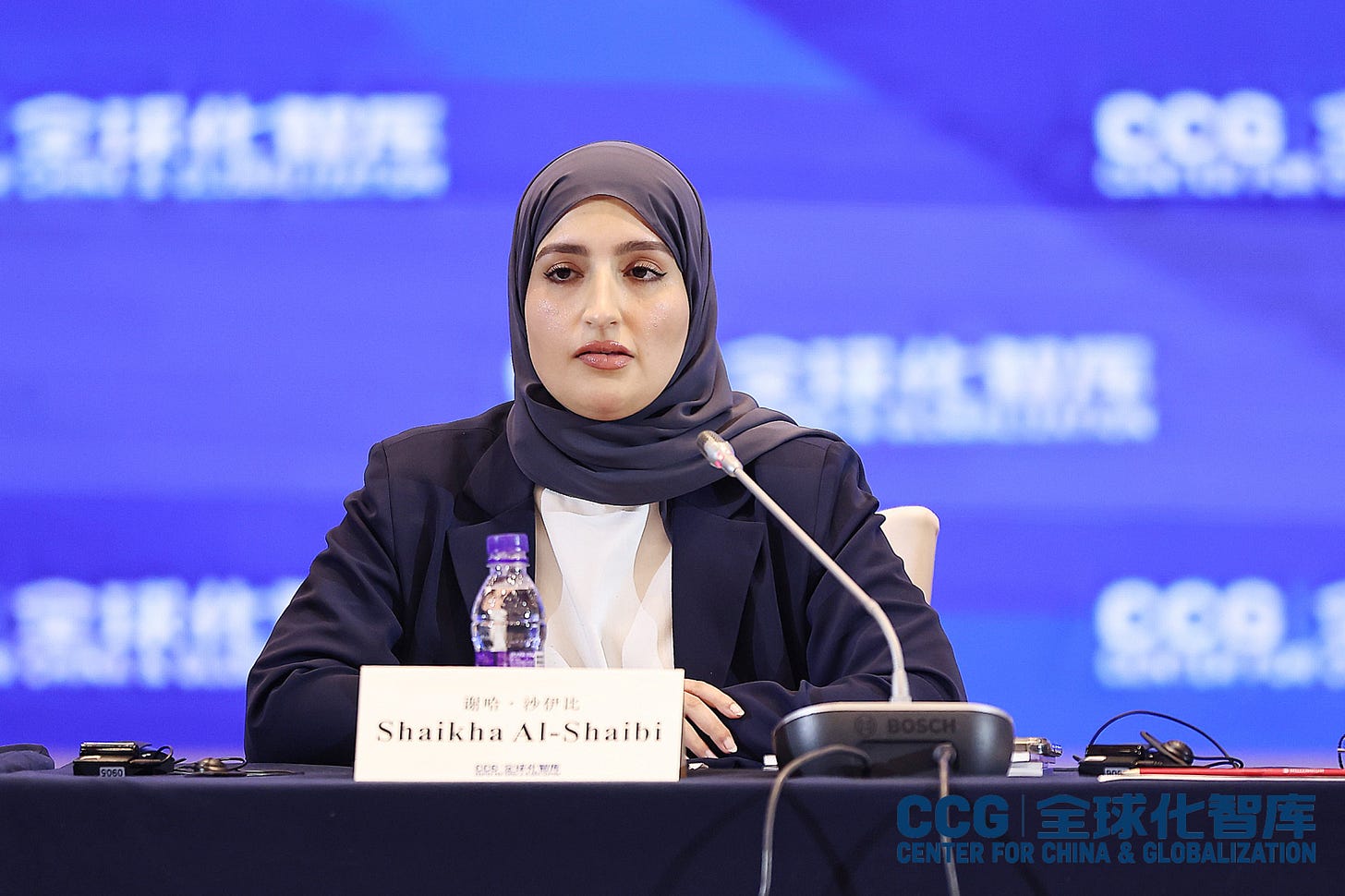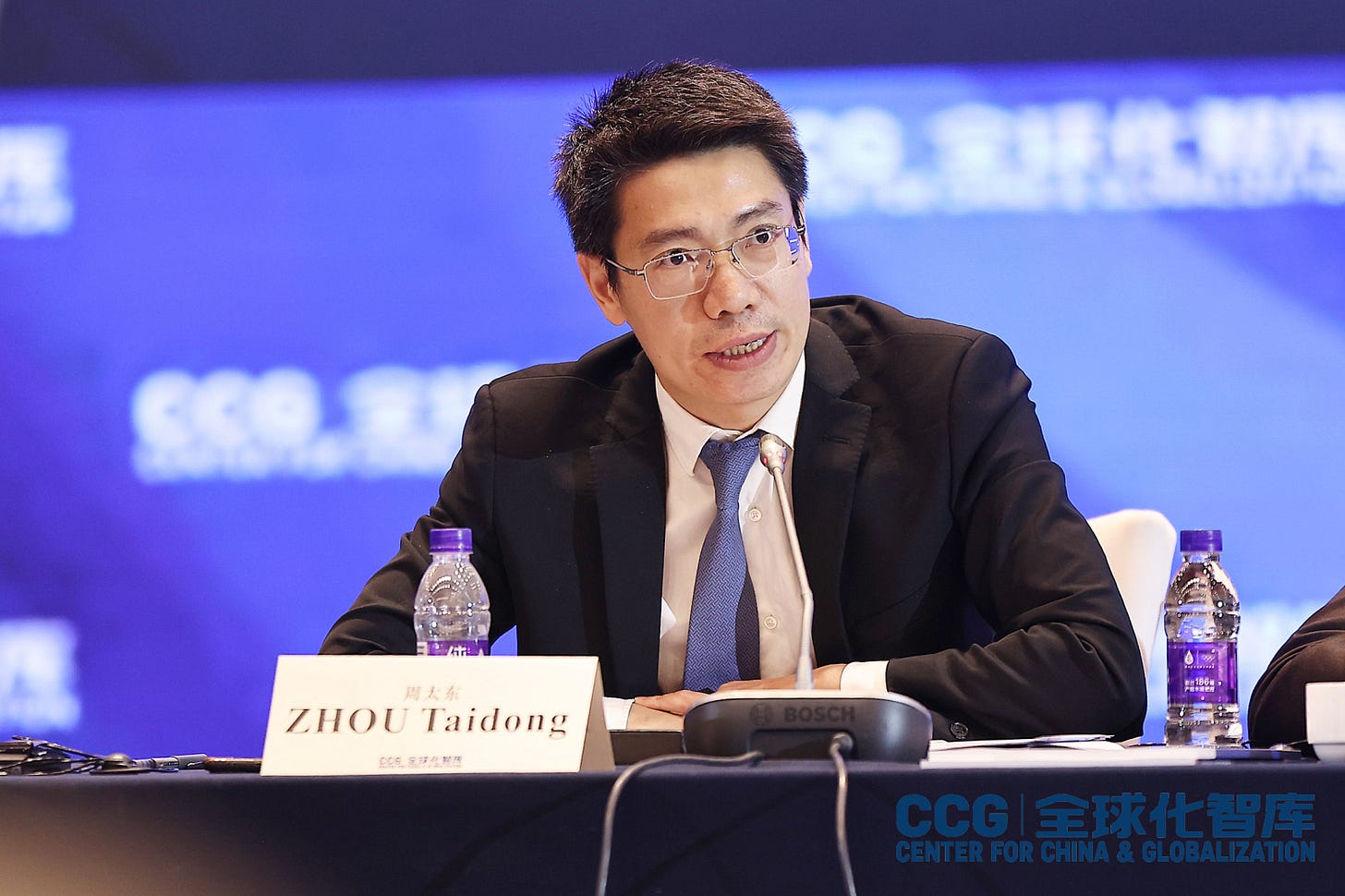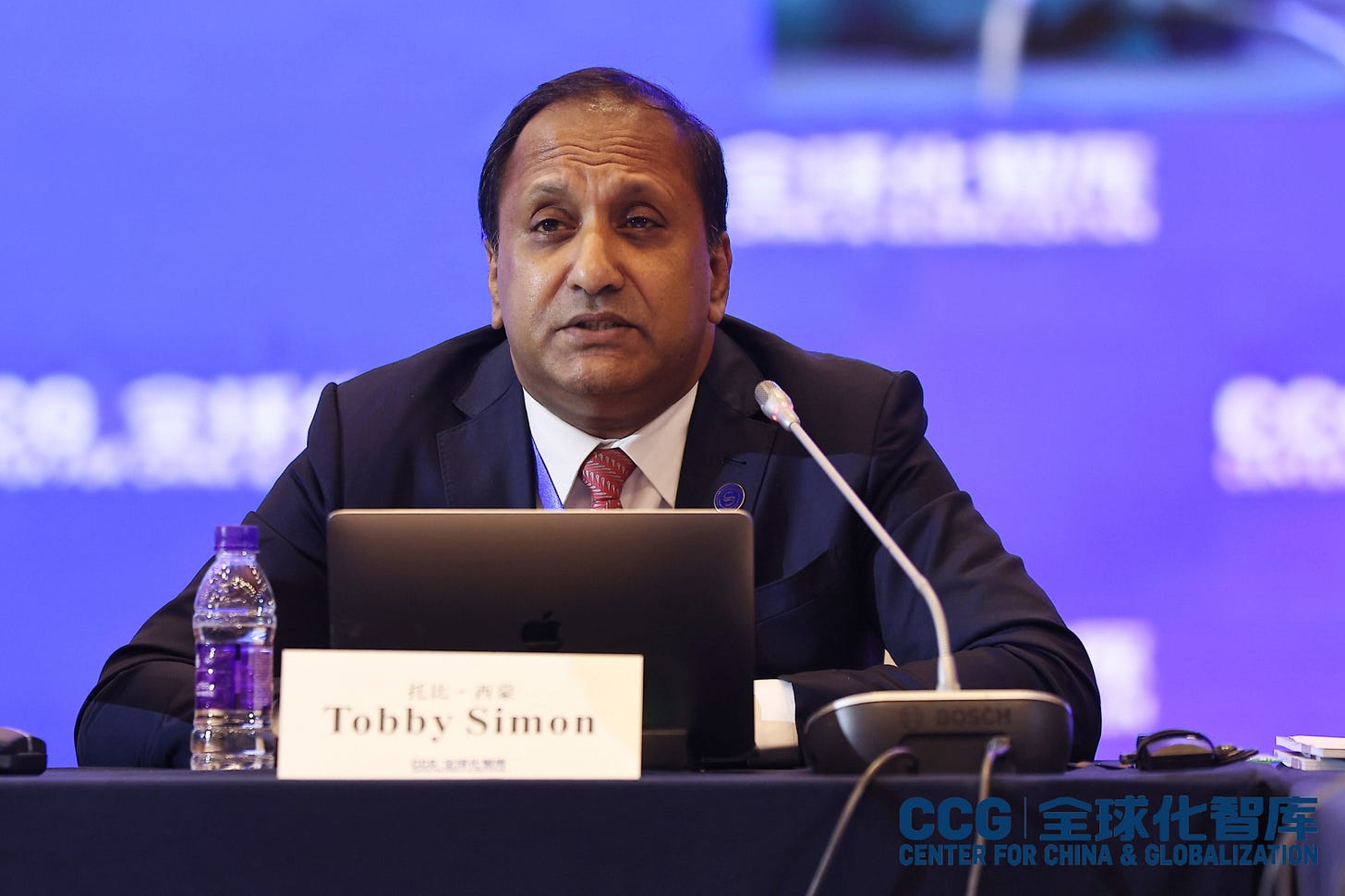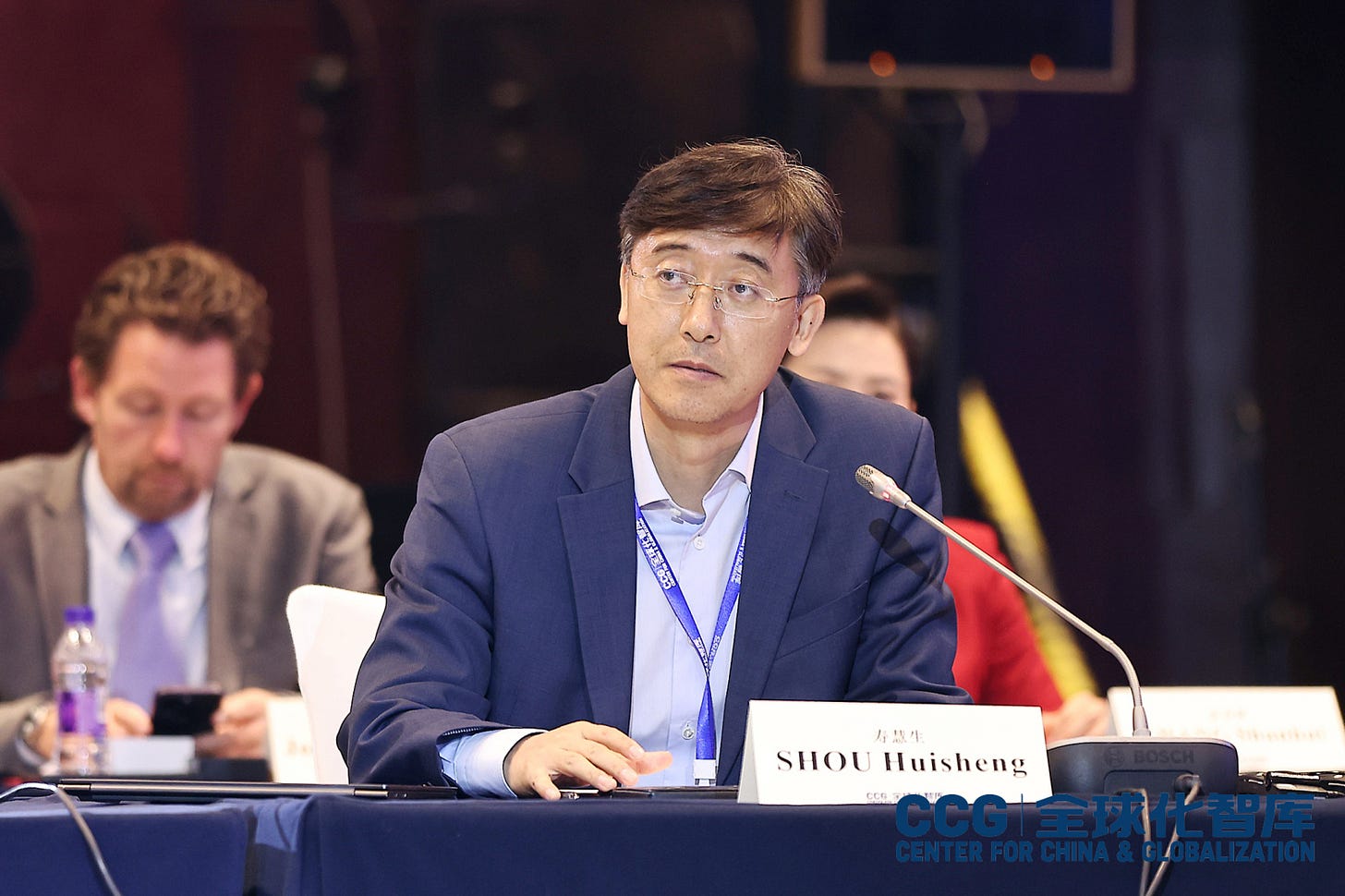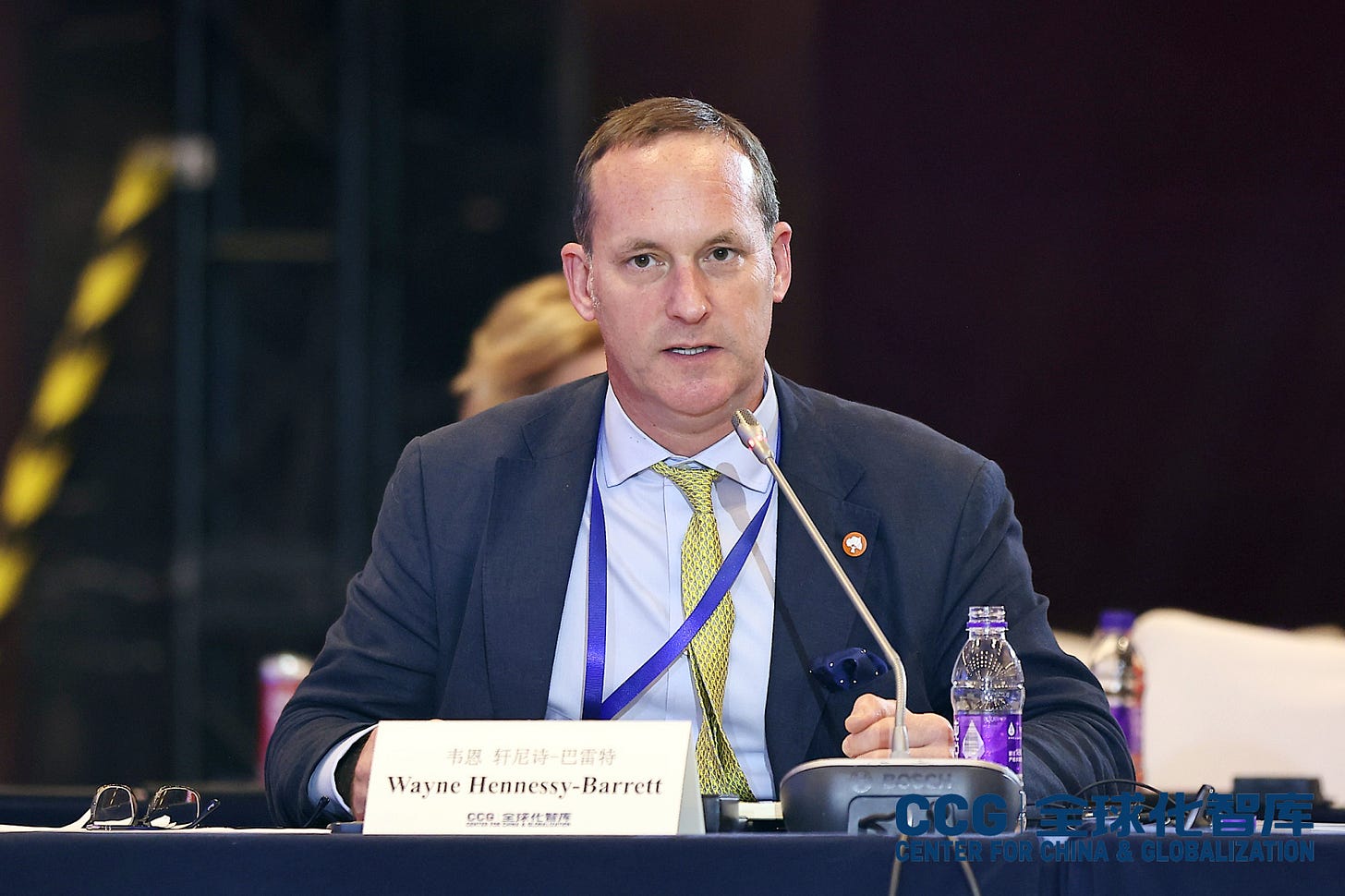Transcript: Reshaping Frameworks for Global Governance: The Role of China and the Global South
Partnering with the Doha Forum, CCG hosted roundtable within the 11th China and Globalisation Forum running from May 22-24, 2025.
This is the transcript of the roundtable themed “Reshaping Frameworks for Global Governance: The Role of China and the Global South,” from the 11th China and Globalisation Forum.
The forum, jointly convened by the Center for China and Globalization (CCG) and the Chinese People’s Association for Friendship with Foreign Countries (CPAFFC), and co-organised by the Academy of Contemporary China and World Studies (ACCWS) and the China-United States Exchange Foundation (CUSEF), ran a three-day agenda from May 22 to 24.
The video recordings of the forum have been broadcast and remain available on the Chinese internet, as well as CCG’s official YouTube channel.
Following the opening ceremony, opening roundtable, and the roundtable on U.S.-China trade war narratives, this session was co-chaired by Mabel Lu MIAO, CCG Co-founder and Secretary General and features special remarks by
Henry Huiyao Wang, Founder and President, CCG; Former Counsellor to China State Council
Maha Al Kuwari, General Manager, Doha Forum
Panellists included:
Unal Cevikoz, Former Member of the Turkish Parliament
Khalid Emara, Former Assistant Foreign Minister of Egypt (tbc)
LU Ruquan, President, China National Petroleum Corp Economics and Technology Research Institute
Rashid Al Mohannadi, Nonresident Fellow at the Middle East Council on Global Affairs
Shaikha Al-Shaibi, Head of Partnership Planning and Evaluation, Qatar Fund for Development
ZHOU Taidong, Vice President, Centre for International Knowledge on Development (CIKD)
Tobby Simon, President, The Synergia Foundation
Shou Huisheng, Nonresident Senior Fellow, CCG; Director of the Centre for Turkey Studies, Beijing Language and Culture University
Wayne Hennessy-Barrett, Founder and CEO, 4G Capital
The transcript is based on the video recording and has not been reviewed by any of the speakers.
Roundtable | Reshaping Frameworks for Global Governance: The Role of China and the Global South
Mabel Lu MIAO, Co-founder and Secretary General, Center for China and Globalization (CCG)
Good afternoon. Welcome back to our panel.
Actually, this roundtable is in partnership with the Doha Forum. We’re pleased to host our friends from different countries to visit Beijing, to visit China, and to participate in the 11th China and Globalisation Forum.
In the past decade, our forum has not just focused on developed countries—we’ve also been very interested in the Global South. I remember a few years ago, we didn’t call it the “Global South”; we called it “developing countries” or the “rising powers.” But today, I think this concept is very prevailing, very popular. That demonstrates how significant the Global South is for global governance.
So, to align with the topic we discussed last December at the Doha Forum, today I also would like to highlight "Reshaping Frameworks for Global Governance: The Role of China and the Global South." Of course, China is part of the Global South—emotionally, economically, and politically.
The shifting priorities of major world powers are creating an urgent need to recalibrate global governance frameworks. As competition between the United States and China intensifies and the political landscape evolves, the future of international trade, technology regulation, and diplomacy hangs in the balance.
This session will explore whether China’s growing partnerships with the Global South can help stabilise the fragmenting global order, or whether pressure from strategic competition, trade tensions, and emerging technology challenges will drive deeper divides. Amid ongoing conflicts in the Middle East and mounting pressures on multilateral institutions, participants today will explore whether a more inclusive model of global cooperation can take shape, or whether multilateralism will drift further into marginalisation.
So, first of all, I’d like to invite two special remarks: one is from CCG’s Founder and President, Henry Huiyao Wang, and another from the General Manager of Doha Forum, Miss Maha Al Kuwari. We would like to invite both of you to deliver special remarks for this roundtable. Later, we’ll enter the roundtable discussions. I would like to invite everyone to speak candidly and frankly. Thank you.
Now, I’d like to hand over to Dr. Henry Huiyao Wang, President and Founder of CCG.
Henry Huiyao WANG, Founder and President, Center for China and Globalization (CCG)
Thank you, Dr. Miao and Madam Maha Al Kuwari. Distinguished guests, panellists, and participants of this important roundtable session,
CCG is very honoured to jointly host this with the Doha Forum. We know Doha Forum is one of the largest forums in the world and has been very well-run for many years. I have personally participated a few times.
Distinguished guests, colleagues and friends, thank you for joining us. It’s really a great honour to have this roundtable today, hosted by CCG and Doha Forum—a premier global platform for dialogue and collaboration.
Let me first briefly introduce the Doha Forum. Since its establishment over 20 years ago (10 years longer than CCG Forum), Doha Forum has grown into a key space where leaders from government, international organisations, academia, civil society, and business come together to share ideas, address global challenges and develop actionable policy recommendations. It has become an open and dynamic forum for the exchange of ideas and the creation of pragmatic solutions amongst today’s complex global environment.
The Center for China and Globalisation is proud to be a long-term partner of the Doha Forum. As one of China’s leading non-government think tanks dedicated to global engagement, CCG has actively promoted international dialogue and cooperation in many ways. We are also very proud to be partners with the Munich Security Conference, the Paris Peace Forum, and many more international forums. Doha Forum is one of the best partners we have had over the years.
We have participated in the Doha Forum multiple times—one of the earliest participants, probably, from China in 2018, 2019, 2023, and 2024—bringing China’s voice to this important international dialogue platform. As recently as last December, CCG had the honour to organise and join a high-level panel at Doha Forum titled “China’s Role in a Rising South: Redefine the Future Global Order.” The panel featured distinguished leaders, including the President of Namibia, the President of Rwanda, the Foreign Minister of Honduras, Prime Minister of Barbados—well-known global leaders. Their presence, together with CCG hosting alongside the Doha Forum, highlighted China’s desire to expand partnerships with Global South countries.
Today, the Global South represents more than half of the world population, the lion’s share of global economic growth, and vast cultural diversity. In a world faced with geopolitical tensions, economic uncertainties, and urgent environmental challenges, voices from the Global South are more crucial than ever in building a fairer, more inclusive, and sustainable international system.
The deepening ties between China and countries across Asia, Africa, Latin America, and the Middle East reflect a shared vision—a vision based on mutual respect, win-win cooperation and peaceful development.
So, this roundtable is a timely and important opportunity to explore how these partnerships can stabilise and renew global governance frameworks, reflecting the diverse interests and aspirations of our increasingly multipolar world.
At CCG, we remain deeply committed to fostering these conversations, promoting mutual understanding, and contributing China’s perspective and practical solutions to global challenges. Together with international partners and platforms like the Doha Forum, we are striving to build bridges that encourage cooperation and peaceful coexistence.
So we are very pleased to have this important panel join us this afternoon. Thank you so much for participating, and we’d like to hear from you. Thank you.
Mabel Lu Miao
Thank you, Dr. Wang. Actually, I’m also a participant and speaker at the Doha Forum. It was quite impressive when I first participated in 2018. I remember at that time, I was the only Chinese speaker on that platform. I was so impressed that I sent the message to Chinese scholars and think tank circles.
Many friends here are Doha Forum participants—like Minister Zarif, I know you’re here. We also met at the Doha Forum, among many others. Yes, I remember Doha Forum’s values: diplomacy and dialogue.
So, I’d like to hand over to Miss Maha Al Kuwari, General Manager of Doha Forum, to deliver special remarks.
Maha Al Kuwari, General Manager, Doha Forum
Thank you, Dr. Miao, Dr. Henry, and Your Excellencies, distinguished colleagues,
It is an honour to join you today at the China and Globalisation Forum, a platform that continues to demonstrate the enduring power of open dialogue and international cooperation in a rapidly changing world.
I am proud to represent Doha Forum, a platform rooted in diplomacy, dialogue, and diversity, which are principles that are essential to building a more just and inclusive global order.
We gather at a time when the foundational assumptions of international governance are under pressure: from shifting geopolitical alignments to widening social and economic divides, and the emergence of new centres of power, specifically across the Global South.
The world is undergoing a profound transformation. For countries like Qatar, which serve as bridges between regions, the imperative is clear: We must move beyond questioning whether new approaches are needed and focus instead on how we can co-create solutions that are equitable, effective, and grounded in the complex realities of today’s interconnected world.
This session comes at a critical and important moment. China’s role as a convener, investor, and development partner across Africa, Latin America, Asia, and the Middle East has opened new avenues of South-South cooperation.
At the same time, nations across the Global South are stepping forward. They are asserting not only their needs but their capabilities in shaping international norms, trade architecture, and multilateral institutions.
This shift represents not just a redistribution of power but a redefinition of leadership—one rooted in shared interests, mutual respect and collective progress. At Doha Forum, we are proud not only to bring together diverse perspectives but also to actively promote ideas and partnerships that can drive meaningful impact.
In past editions, we have explored pressing issues such as the future of the United Nations, the modernisation of development finance, and the role of rising powers, including China, in shaping more representative global frameworks.
Last year, we welcomed over 5,000 participants from 160 countries to Doha. This December, under the theme “Justice in Action: Beyond Promises to Progress,” our 23rd edition will focus on making global governance more responsive, inclusive, and accountable.
We are so deeply honoured to have Qatar’s voice contributing to today’s dialogue and to count the Center for China and Globalization as a trusted strategic partner. Our collaboration reflects a shared belief in pragmatic reform, constructive engagement, and the power of platforms like ours to bridge divides and catalyse action.
Today’s panel is more than a discussion. It’s a step forward in the collective reimagining of a fairer, more resilient global system. I look forward to the insights and perspectives from around this panel and to deepening collaboration between our platforms as we work towards more inclusive and effective global frameworks. Thank you.
Mabel Lu Miao
Thank you, Maha. Next, let’s go to the roundtable. As I mentioned, we’ve invited many distinguished guests from different countries. Yes, the bipolar world has gone; a multipolar world is now reality. Today, we’re talking about the Global South and China’s role.
We can work together to offer public goods and pose some questions for our later discussion:
Where are models of global cooperation succeeding amid intensifying power competition?
How can China and the Global South collaborate to reform global governance frameworks to better reflect contemporary geopolitical and economic realities?
Can partnerships between China and the Middle East/Gulf states offer a model for South-South cooperation on energy, technology, and conflict resolution?
Amid rising geopolitical tensions, what role can multilateral institutions such as AIIB play in advancing the Sustainable Development Goals, which provide a framework for multilateral governance and international cooperation?
What concrete steps can actors from the Global South take, individually or collectively, to stabilise a global order characterised by fragmentation and multipolarisation?
Without further ado, I’d like to invite the first speaker. Following alphabetical order, I’d like to invite the former member of the Turkish Parliament, Unal Cevikoz. Sorry, maybe my pronunciation of your name is not correct.
Unal Cevikoz, Former Member of the Turkish Parliament
Thank you, Madam Chair. Your pronunciation is perfect. Thank you very much. You’ve asked many questions, and I’ll take this opportunity to give a brief perspective on this crucial topic at a time when uncertainty and unpredictability are becoming major impediments to global governance.
I am of the opinion that China and the Global South hold significant potential in reshaping frameworks for global governance. As Turkey seeks to position itself as a bridge between East and West, the emergence of a multipolar world where nations like China play a pivotal role is seen as an opportunity for rebalancing global power dynamics.
I will try to explain that view based mainly on five concepts: strengthening multilateralism, economic partnerships, shifting power dynamics, cultural and political dialogue, and finally, advocacy for fair representation.
Firstly, Turkey advocates for multilateralism in addressing global issues such as climate change, health crises, and economic inequality. China’s influence in multilateral institutions such as the United Nations or BRICS can help amplify the voices of the Global South, allowing for a more inclusive approach to governance that reflects the interests of developing countries.
Second, China’s Belt and Road Initiative is deeply significant for Turkey as it enhances infrastructure development and connectivity between Asia, Europe and beyond. This initiative can serve as a blueprint for fostering economic cooperation among Global South nations. Turkey views itself as a critical hub in this initiative, advocating for economic frameworks that promote sustainable development and shared prosperity.
Third, with the rise of China and other emerging economies, traditional power structures dominated by the West are being challenged. Turkey supports the idea that Global South countries, under the leadership of China, can reshape norms and policies to better serve their interests, focusing on development, rather than conditionalities often imposed by Western nations.
Fourth, Turkey emphasises the importance of cultural and political dialogue among nations of the Global South. China’s engagement can facilitate exchanges that promote a better understanding of different governance models, thus helping countries to design policies that align with their unique social and economic contexts.
Fifth, Turkey advocates for reform in international organisations to ensure fair representation of Global South countries. As China increasingly takes on leadership roles, it can champion the cause of equitable governance structures that empower developing nations, paving the way for more robust participation in decision-making processes.
From Turkey’s standpoint, the collaborative efforts of China and the Global South have the potential to redefine global governance frameworks, fostering a more equitable and representative international system. This perspective also aligns with Turkey’s own aspirations for a more balanced global order that prioritises development, cooperation, and mutual respect among nations.
I would also like to mention a visionary view, which has been frequently referred to in the morning panels, which is regionalism. The role that China plays in the Pacific and Asia to enhance regional cooperation and integration also complies with Turkey’s foreign economic policy in the Middle East, in the Caucasus, but also in the wider Eurasian geography.
This is one of the reasons why Turkey is, for example, enhancing its connectivity with the Shanghai Cooperation Organisation and BRICS. And I think this, in a way, coincides as far as the interests of China, Turkey, and also the Global South. And here, I would like to conclude my remarks. Thank you.
Mabel Lu Miao
Thank you, Unal. That was a great speech. Actually, I remember Minister Fidan, who is the Foreign Minister of Turkey, delivered a very interesting speech at my centre last year. He mentioned that although Turkey is a NATO member, they still want to join the BRICS. So I think this is an important message, and this integration process of the Global South is crucial for global governance.
Next, I’d like to invite the former Assistant Foreign Minister of Egypt and former Egyptian Ambassador to Iran, Bulgaria, and North Macedonia, Mr. Emara.
Khalid Emara, Former Assistant Foreign Minister of Egypt and Former Egyptian Ambassador to Iran, Bulgaria, and North Macedonia
Thank you very much, Madam Chair. Let me begin by thanking the China and Globalization Forum and the Doha Forum for this opportunity to make a small contribution to the topic of global governance and the role of China and the Global South.
I’m not necessarily going to address this from an Egyptian perspective, but I want to speak more about the Global South as a rising force today in the world. I want to start by mentioning a few examples of how that rise materialises and the essence of the contributions of Southern developing nations to the global governance architecture.
BRICS definitely represents 42% of the world population. It represents 35% of the GDP, 25% of world exports. And very important African and Middle Eastern countries are part of BRICS. We're very happy to see the expansion of this group and the interests expressed by other global players in joining that particular group of countries. It is a push forward for the recalibration for the system of governance as we see it today.
Definitely, diplomacy is a very important tool in creating such dynamics for changing the global governance structures, what I would call diplomacy for building partnerships. And I would mention two important initiatives that China and both Africa and the Arab world have been leading for the last 20-plus years.
FOCAC, the China-Africa forum, is a very important tool for developing relations within the Southern structures. It has created more than 280 billion dollars of trade within the African continent and China. It has created more than 40 billion investments annually. These are huge numbers for the African continent. Then they have made a very important contribution to building the most needed infrastructure on the continent, but also in connectivity among African countries themselves, in launching free trade arrangements within the African Union in the last few years. These are all very important tools in advancing Global South relations.
The same goes for the cooperation between China and the Arab world, the China-Arab partnership, where more than 400 billion of trading is taking place, where also a big amount of the energy needed for China’s development is coming.
I think these are examples of how practically the Global South is active and reshaping the order that exists and that is dominated by Western-led societies, as we have been listening since the morning up till now.
Now, an element that is important in the recalibration of the system is something that we have touched upon in the morning, which is soft power as defined by politics, culture, diplomacy, rather than wars and crises and more wars and more military spending and security spending. These are two different models where I think the Global South has made a clear choice of what to follow and what model to follow.
While I think most of the countries in the regions that I talked about, both in Africa and the Middle East, have suffered from multiple crises and multiple civil wars, we see that today, through the different forums that I have just mentioned, another development opportunity is unveiled to countries in the Global South, and this, in itself, is a very important choice where today we see countries are embracing more and more this model for development, for the future.
I would think that China definitely would have to step up its efforts, both politically and culturally, to deepen this trend within the Global South to offer a development model that can be tailor-made for the different economies in the Global South, and also would provide the necessary tools for communication among civilisations, but also among think tanks, among academia, to be able to anchor these changes that is definitely fuelling the developments that I mentioned in both Africa and the Middle East. Thank you very much.
Mabel Lu Miao
Thank you very much. Yes, China right now is engaging with many Global South countries. I remember just last week, China just concluded the China-CELAC Forum with Latin American and Caribbean countries. As you mentioned, the Arabian and FOCAC with African countries, we had a lot of those economic and cooperation platforms. Through those platforms, I think it's also a good path to offer public goods for the world, especially for global governance when great power competition and tensions are serious. Once again, thank you.
Next, I’d like to invite Dr. Lu Ruquan, who is the president of China National Petroleum Corp Economics and Technology Research Institute. Dr. Lu, please.
Lu Ruquan, President, China National Petroleum Corp Economics and Technology Research Institute
Thank you, Dr Miao. I'm from CNPC, China National Petroleum Corporation, one of the largest energy companies in the world. I’ll touch on the international energy governance among China, the Global South, and developed countries. And I will have three observations.
First, in the energy sector, global governance mainly refers to the relations between energy-producing, consuming, and transit countries, where multinational corporations can link these three. Therefore, producing countries, consuming countries, transit countries and multinational corporations are the four players or actors in the global energy governance system.
Over the past half century, the international organisations of producing countries have been represented by OPEC, behind which the producing countries are the Global South, such as the Middle East, Africa, Latin America and Asia-Pacific. And the international organisation of consumer countries is represented by IEA, behind which are the developed countries like OECD in Europe, and United States, and Japan, etc. The transit countries refer to the countries in the middle, such as Ukraine and Turkey. And the multinational corporations refer to the oil giants in Europe and the United States, and also like CNPC, my company, and also, Sinopec, Saudi Aramco, Petrobras, Petronas, etc.
Of course, in the period of climate change and energy transition, some new international organisations such as IRENA and OGCI [have emerged]. OGCI means Oil and Gas Climate Initiative, which is initiated by the top 15 international energy companies, including CNPC, and they are playing an increasingly important role in promoting energy transition.
Secondly, the impact of geopolitical conflicts on the global energy governance system is fatal. In the past few decades, oil and gas exporters such as Russia and importers such as Europe have formed a relatively stable framework for international energy governance through transit countries such as Ukraine and Turkey. We used to think that this contemporary relationship of resources and the market was unbreakable and resilient. However, in 2022, the outbreak of the Ukraine crisis broke this framework, which shows that even the most solid international energy governance system cannot withstand the blow of big power game and the geopolitical conflict and confrontation.
So, currently, Europe has given up on Russia’s natural gas and oil. And right now, 60% of Europe’s natural gas and LNG imports come from the United States. Russia has no choice but to increase oil and gas exports to India and China. Ukraine’s former status as a best transit country is no longer the case, and the European and American multinational corporations left Russia at the very beginning of the war.
Certainly, in the context of U.S. energy independence and Trump’s return to fossil energy and withdrawal from the Paris Climate Agreement again in the 2.0 period, China, as the world’s largest oil and natural gas import market and the world’s largest new energy producing capability, will form a new type a new type of international energy governance relationship with the Global South and the EU respectively.
On the one hand, China currently imports 550 million tons of oil and 180 billion cubic meters of natural gas annually, firmly ranking as the world’s largest natural gas import market. Meanwhile, Middle Eastern oil exporters represented by the Gulf States, African importers represented by Angola and Nigeria, Latin American exporters represented by Brazil and Venezuela, and Central Asia exporters represented by Kazakhstan and Tukmanstan, etc., all of them regard China as the largest importer and consumption market, which will strengthen China’s energy governance relationship with above mentioned countries in the Global South.
On the other hand, China currently accounts for about half of the world’s production capacity in new energy sectors such as PV panels, energy storage batteries, wind power equipment, and EVs. As China and the EU have become the world’s leading forces in continuing to promote the energy transition and climate change, it is believed that these two sides will deepen their cooperation in the area of new energy governance.
In addition, if the U.S. and China reach a new tariffs and trade agreement after 90 days, it means that China will import large quantities of U.S. oil and gas to ease the U.S. trade deficit with China, in which case the energy governance pattern between the U.S. and China will also change. That’s all. Thank you.
Mabel Lu Miao
Thank you, President Lu. Yes, President Lu from the industry. The CNPC itself is an energy giant. You had a rich experience of cooperating with many Global South countries in the industrial field. You offer a very important topic and an important speech. And Mr. Lu himself is a well-known scholar in energy and a think tank in China as well.
Next, we would like to invite another speaker who is a Non-Resident Fellow at the Middle East Council on Global Affairs, Rashid Al Mohannadi, please.
Rashid Al Mohannadi, Nonresident Fellow at the Middle East Council on Global Affairs
Thank you. This is the third time I speak today, so I hope you don’t get bored of my talking points. First of all, I’d like to thank both CCG and Doha Forum for arranging this workshop. It’s very honouring to be speaking with these distinguished guests and especially with three voices from Qatar.
So, I’ve already spoken about Colombia’s decision to join the New Development Bank and how that reflects a broader trend of countries shifting away from Western-led organisations. And during this month, again, I mentioned that the GCC and ASEAN had a summit. I won’t repeat those points, but it’s important to show that the traditional institutions we’ve built after World War II, whether the UN, the WTO, and the Bretton Woods System, have been a source of stability and delivering global goods, protecting global commons, and pushing forward development and modernisation. But today, they are failing in addressing our key challenges of poverty, conflict, and development.
Meanwhile, we look at regional organisations like the GCC resolving its most daunting internal issue. In 2017, we had the Qatar blockade. It was resolved through mostly internal Gulf dialogue. ASEAN managing major issues in the Southeast Asia region, mainly the crisis in Myanmar, the EU moving towards more defence independence. So, these are not experiments. They're functioning mechanisms. So the future of cooperation is regional.
Now, to answer one of the questions of today’s panel is China’s role with the Global South. We should be clear that China is not trying to be another United States. That’s a good thing. What China has been doing instead is enabling regional actors to take the lead. It brokered the return of Saudi-Iranian diplomatic relations. Quite recently, it provided LNG carriers to Qatar. Qatar is moving to increase its production of LNG from 77 million tons to 140 million tons, doubling its production, much of it going to China, which will empower China’s energy transition. China has been offering tech, capital, mediation, not ideology.
Regarding developmental frameworks, we’re still being asked to chase outdated global targets. Let us be honest, Sustainable Development Goals (SDGs) are obsolete. The SDGs are well-intentioned, but they’re misaligned. They do not match the developmental priorities of the Global South. I am from the Global South; I can tell you that. And often, they block progress in the name of climate benchmarks designed by countries that have been polluting for centuries.
Quite recently, I was honoured to visit the country of Guyana in Latin America. They have discovered a lot of natural gas and oil deposits, and now they are being lectured on environmental sustainability rather than pursuing their economic interests. So, we should be talking about environmental justice.
What should be done? So, I’ve listed a few recommendations.
For China, China is a big source of development for the Global South. But most of it has been very transactional. I think investment in people, not just projects, is paramount, even though sometimes the recipient countries would not ask for it. Localisation of partnerships through localising the supply chain, relying on local contractors and more support to regional organisations.
As for the Global South, what we need to do is redefine our developmental goals aligned with the aspirations of the people and with the national interests of the states of the Global South. And most importantly, diversifying our relationship with different global powers.
One of the framing questions I received while preparing for this panel was: what concrete steps can actors from the Global South take individually or collectively to stabilise a global order?
Individually, the states of the Global South can do nothing, but collectively, they can do many things. Like I said in my last two presentations, the states of the Global South need to develop regional architectures for their economic, security, and societal needs.
In the study of power in politics, there are three sources of power: inherent power, like what the U.S. and China have through their own power; derivative power, through the small states’ relationship with greater powers; and collective power. The Global South and the states of the Global South should focus on pooling their capabilities and capacities to steer forward their interests.
To conclude, our entities—think tanks, research institutes, research centres—these entities shaping and supporting our respective nations’ policies, need to intensify our engagement for a better understanding of each other’s challenges and interests and to steer our policies towards more stability and development in our regions. Thank you and xie xie.
Mabel Lu Miao
Thank you. I think it’s a very impressive speech. As you know, I believe the think tanks and civil society should get more integrated among the Global South countries themselves. Like in the last session, we mentioned the U.S.-China narrative. Actually, I think the U.S.-China narrative should be shaped by third parties as well. Sometimes, I travel around the world and participate in think tank conferences and media conferences, and usually, the agenda or topic is something like this: “U.S.-China race for primacy.” I wonder: What is primacy? Why should the U.S. and China race for primacy? This, in itself, is a kind of narrative building by third parties. We don’t want to follow into that kind of language or presentation. This is a kind of philosophy level. But human beings should get out of the prison of language; language itself is a trap, like the primacy competition. Thank you again.
I would like to move to the lady, Miss Shaikha Al-Shaibi, who is the head of Partnership Planning and Evaluation, Qatar Fund for Development. Please.
Shaikha Al-Shaibi, Head of Partnership Planning and Evaluation, Qatar Fund for Development
Thank you so much, Dr. Mabel. I would like to thank the Doha Forum and CCG for hosting such an incredible session that is tackling such an important topic that we should all be speaking about.
So, speaking from a development perspective, at the Qatar Fund for Development, we are currently reshaping our way of engaging in global development. We’re transitioning from traditional aid all the way to a new model that is rooted in investment in sustainability. This means that we are using blended finance, catalytic capital to deliver impactful solutions for countries that are, of course, from the Global South, but also beyond countries that are from the Global South.
At first, when we say that we’re trying to tackle investments, we’re looking at efficiency and how can we use funding in the best way ever possible. When we’re talking about delivering impact-driven solutions, it’s a shift that aligns closely with the evolving spirit of the South-South cooperation.
So, we’re not speaking here only about shared history or shared political solidarity. We’re also speaking about co-designing and co-financing and creating shared accountability. In that context, partnerships between China and Gulf States, especially like QFFD, offer a promising model for South-South cooperation. China brings unparalleled scale, innovation, experience, technology, and infrastructure, whereas in return, Gulf states such as Qatar Fund for Development have a strong record in humanitarian aid and adaptive financing and programming on sustainable development.
If we can come together as one force, we can deliver a model that is tailored towards solutions, that speaks to the realities of the Global South, whether it’s in energy, in digital transformation, or even in post-conflict recovery.
But beyond finance and infrastructure, there is one thing that we must always not forget: that before we are trying to achieve any fields in development formatting, we must remember that it must always remain human-centred.
At QFFD, we place a strong emphasis on supporting women and youth in the development and post-development conflicts. For instance, we have one of our initiatives, which is called the Women in Conflict Zones initiative. This initiative is solely dedicated to empowering women in conflict zones, where women are being given the space and being empowered the capabilities and capacity-building learning skills to be able to speak up with their countries and especially with countries in the Global South.
So, as I speak to you here today about this amazing forum, I see a lot of great women, women that come from massive countries. Of course, not to mention there are great men as well. And each one of you had the chance to speak up and to specify the needs, whether you come from a Global South country or not.
However, when we detect these countries and determine what do we want to do in the Global South, how must we know the issues if we cannot hear the backstory of the whole problems and the needs that are for certain individuals in these communities? How are we going to assess their needs? How are we going to hear them? How are we going to be able to detect what are exactly are the real issues that need to be tackled from a Global South perspective, but again, from beyond that, our collaborations together?
So, back to my point. We’ve witnessed at QFFD firsthand how inclusive grassroots approaches foster healing, resilience, and social cohesion, even in the most pressing and most challenging destinations, such as destinations with currently rising conflicts in Gaza, Sudan, Yemen, Ukraine, and beyond these countries as well.
Equally important is country ownership. We must also understand that development should never be imposed. Development should always be locally led and nationally owned. So, how can this be completed? One example that I always like to bring to the table is our support to Seychelles. We’ve done a project with them on infrastructure, where QFFD came from a finance background. We collaborated with the national government, but the whole implementation was handled by the national government. Two actors, we are both coming from the Global South, we are both able to collaborate on sustainability and development and tailor a program that is locally owned and nationally led by the country of Seychelles.
So, as we look to the future, we must ask ourselves: how do we recalibrate global governance through a development lens? Well, I believe the answer here relies on coalitions. Coalitions should always have a purpose. That purpose should always be rooted across the rising issues of the Global South.
When we speak about the issues of the Global South, we must also consider inclusivity. We must also consider diversity. We must also make sure that the basic resources in these countries are applicable to the people within that community, for them to be able to cooperate and be a part of it. But by pooling our financing, institutional, and technical resources, we can create more than just locally grounded and responsive local ecosystems.
In closing, I see that there is potential in the Gulf-China relationship. As a model for the next-generation development cooperation, with joint investments, shared learnings, and a mutual commitment to our outcomes, we can strengthen the agriculture for South-South cooperation. Last but not least, we must remember that whatever ideas we have that will hopefully come into action do not only lie in projects that we must implement, but in systems that we need to actually create, for us to better create resiliency and opportunities for people who are not privileged, I would say. Thank you.
Mabel Lu Miao
Thank you. Next, we would like to jump to Mr. Zhou Taidong, Vice President of the Centre for International Knowledge on Development (CIKD) under the State Council. Actually, Mr. Zhou has another arrangement after this conference, so we apologise for jumping to him first. Yes, please.
ZHOU Taidong, Vice President, Centre for International Knowledge on Development (CIKD)
Thank you, Dr. Miao, for the kind invitation and sorry about jumping. So, I think it’s the right time to talk about China and the Global South. And for this session, we have a lot of very good questions.
I think the current world, as we look around, we talk a lot about turbulence and uncertainty. But I think we need to look at the positive side to see hope, so that we can keep faith, because we are really in a very troubling world.
So, I wanted to see how the Global South, especially maybe in the very recent events, some of the specific examples, how China and also the Global South can work together and have made some achievements. I think these are very recent, and I hope this can give us some thoughts for reflection.
The first one, I think, of course, is the ongoing World Health Assembly. Yesterday, it adopted a historic pandemic agreement, because that agreement is likely to make the world more equitable and safer from future pandemics. Of course, before that, we should also see last year’s amendments to the International Health Regulations were also passed. They all have their own limits, but I think these are key moments for global health governance.
The same could be said, I think, for last year’s COP 29. There was significant progress in operationalising the loss and damage fund, including agreements on trustee and secretarial arrangements and the leveraged pledged contributions of more than $730 million.
These are some of the achievements, I think, Global South countries have worked together and made happen. But we can also see some other very recent examples that China is playing a role. For example, yesterday, we saw the announcement of the completed negotiations between China and ASEAN to further refine their trade area to include the digital and the green economy and other new industries. This 3.0 version of the free trade area will inject great certainty into regional and global trade and play a leading and exemplary role for countries to adhere to openness, inclusiveness, and win-win cooperation.
There are also other examples in terms of innovating global partnerships. For example, in February 2015, the Export and Import Bank of China (China EXIM) and UNICEF signed an MOU to collaborate on essential services for the well-being of children in Nigeria, the first such partnership for both sides. This partnership will help UNICEF deliver integrated health care, water, sanitation, and hygiene services for vulnerable children and families. The MOU also highlights mobilising financial resources, providing technical expertise, exploring innovative financing, and promoting local procurement capacity and knowledge sharing.
The last example I want to talk about is the AIIB and the Vaccine Alliance (Gavi) have signed a partnership to provide sustainable financing for health and immunisation systems in low- and middle-income countries. The two organisations will work on joint financing initiatives, with AIIB expecting to provide up to $1 billion in financing for public sector health projects, supporting vaccine procurement, and the introduction of high-impact vaccines in middle-income countries, and exploring additional financing models, such as donor liquidity tools and blended financing.
I think these examples tell us that, despite what we see as backlash or anti-globalisation in other parts of the world, the Global South can really work together and make real change happen.
I think there are three factors why we should be optimistic about this. First, I think there’s a common vision and inspiration, that is development; this is widely shared among the Global South. Second, I think there’s increasing capacity and potential in terms of economic growth, but also population size and political will. Third, I think there are a lot of platforms—our friends mentioned before—like China-FOCAC, China-Arab, but there are others, of course, like BRICS plus and many others, so we don’t need to list them here.
So, we see a lot of strategies for multi-alignment. I think the Global South countries will act together around shared interests. We will see more initiatives, such as new trade routes, settling trade in local currencies, building cross-border payment platforms, and establishing new initiatives and diversifying partnerships and initiatives.
So, we should look at the bright side and see the hope, and then work more innovatively and in a more durable way. I think that’s what I wanted to share today. Thank you.
Mabel Lu Miao
Thank you, Mr. Zhou. The voice from China.
Next, we would like to listen to the voice from India. I would like to invite Tobby Simon, who is the President of the Synergia Foundation from India.
Tobby Simon, President, The Synergia Foundation
Good afternoon, your excellencies, distinguished panellists, and friends,
I want to thank the chair, Dr. Wang Huiyao, Dr. Mabel, CCG, and the Doha Forum for giving me this opportunity. I was fortunate to contribute to one of the books published by CCG recently on the same subject, and I saw that the book is available in the book section in the front.
Reshaping frameworks for global governance often involves strengthening international cooperation and adapting institutions to current and future challenges. I wouldn’t want to speak much about what has been spoken about the Global South because we had some fantastic speakers, but I’ll try to provide some context.
The first context for me is the need to avoid global and regional conflicts, improving the threshold for growth as an aspirational vector, reducing inequities in our societies. These are, I feel, quintessential elements for reshaping global governance.
May I infer the recent conflict between two neighbours in South Asia? If the conflict had continued in the way it is in other parts now, because once you start a conflict, you don’t know when it’ll end. It would have engulfed the whole of South Asia, putting the average citizenry in great economic difficulty and taking the entire region back by a decade or more.
I was amused to find that the narrative of war has now metamorphosed into which military has the best hardware, and often these countries don’t have their own weapons, and they are all imported. So, this becomes a theatre to demonstrate the superiority of kinetics often supplied by external vendors. So, it’s some sort of arms game now.
In the allowed time, let me speak about the following: one is the levers of global governance, second, the challenges, third, China’s role as I see it, which I wrote in the book, China’s strength, and a word on AI and techno-governance, which was spoken about this morning.
First, global governance requires absolute commitment to international cooperation and the active engagement of global institutions. Whether this can be actually brought out is something that we all have to work on together. It’s not between countries alone. It is between organisations, NGOs, civic societies. So, the need to build communication across different layers of societies is so imperative. The Pact for the Future is an example of an initiative to revitalise multilateralism and to strengthen global cooperation.
Promoting inclusive governance in addressing unrepresented voices. This is the challenge of every single nation who wants to reshape this. Global governance should prioritise diversity and inclusion, ensuring that unrepresented voices are heard in the decision-making process. If we don’t do it, what happens? The fringe has come to represent the main societies, and that, as you see in different parts of the world, has got consequences and bears collateral damage.
Third, I would like to speak about leveraging technology, which is now not an option. The gaps between the haves and the have-nots are now going to be more defined by the play that you have on technologies. Obviously, technological advances can enhance global governance by improving communication and data sharing.
Let me now come to the issue of challenges. The first challenge I see is institutional complexity. Global governance involves a complex web of institutions, treaties, and organisations; geopolitical tensions, which we have spoken about; changing global power dynamics, which we have spoken about much; and the need for transformative changes.
Now, I come to the role of China with a caveat. As China seeks to endorse multipolarity and, in a contested world, mitigate what it regards as U.S.-orchestrated confinement, and set the stage regionally for an extended sphere of Chinese influence. Nevertheless, it’s incumbent on Beijing to navigate this path in a way that would bolster China’s global persona as a reliable and ethical frontrunner while concurrently diminishing the perspective of China as a challenge to the neighbouring countries in Asia.
This was often spoken in the morning by an eminent speaker on soft, hybrid, and middle power. So, I think China has a big role to play in this reshaping, but it has to do it with a little bit of a soft handle.
What I see as China’s strength is its deep supply network. I mean, most countries in the region and around the world are extremely dependent on China. Now, China’s contribution to global organisations like the WHO, proactive actions on climate mitigation, an emerging leader in green finance, rising awareness on issues of sustainable development, and the role in emerging tech like AI and quantum.
Let me conclude with a little bit on AI. As AI booms in the world’s most populous country, it holds enormous promise by virtue of its population strength, because no other country can generate such a volume of data that can be fed into a machine for discerning patterns. AI is about that.
According to McKinsey Global Institute, AI-driven automation can add more than a full percentage point to China’s annual GDP growth. AI is an open science, unlike drug development or computer hardware. The open science nature of AI is important for latecomers looking to catch up with front-runners, because it allows them to close the gap in the shortest possible time.
Finally, I will just close with techno-governance, which was spoken about this morning. As we go forward, you would see that global governance is going to be shaped, as one of the speakers has spoken in the morning, by the technological strengths that companies, individuals, nations, and NGOs might have.
Let me give an example, not the best one, but of Pegasus, which we saw and how it was able to reshape a lot of narratives in the Middle East for good reasons and bad reasons. And today, you are seeing somebody like Elon Musk, who is able to probably have a part of the power of a huge military complex that a country would even dream to have.
So, I just want to say that China has a role because it has invested so much in deep technologies, and these technologies can be a great help and a benefit to countries that are emerging and growing. Thank you very much.
Mabel Lu Miao
Thank you. Wonderful. You also highlighted the importance of civil societies and think tanks, and NGO’s role in narrative building and the solidarity of the Global South. I totally agree with what you said.
Next, we would like to invite Mr. Shou Huisheng, Non-Resident Senior Fellow of the Center for China and Globalization, also the director of the Centre for Turkey Studies, Beijing Language and Culture University. Professor Shou.
Shou Huisheng, Nonresident Senior Fellow, CCG; Director of the Centre for Turkey Studies, Beijing Language and Culture University
Thank you so much for being here. I would like to talk about this issue mainly from the U.S.-China relationship perspective to emphasise how important the Global South is.
So, my first point is that, in my view, I would say the Global South will be the strategic battleground that will determine the future of the 21st century. So, we can expect that it will play a decisive factor in U.S.-China competition, at least for the, I would say, the first part of the 21st century. That’s the importance of the Global South. The reason is simple: because of the number, right?
Previously, I think what determined global governance was the G7. And later on, it became the G20. But in the future, I would expect it to become the G100 or maybe G200. That is the fact that more countries are growing and will become equal to everyone else. And then, you cannot be determined by a few countries, certainly not by one country. So, that’s why we have to emphasise the importance of it.
The second point is that I don’t have to emphasise too much about China’s achievements in winning this battleground in the past decades. All the data, I think, everybody is familiar with. But one thing I think is interesting is Trump’s second term, I mean, in the past few months, particularly the tariff war, actually significantly helped China win this battleground. As you see right now, China’s approach to dealing with it, I think, is very satisfactory, not rigid, not timid, and I mean, they are totally different from 80 years ago. And it really gives a good example for the rest of the world.
So, you can see that many other countries, no matter European countries or the Global South, all follow the same way to deal with Trump’s trade war. Even some small countries are also taking a very strong stand against that. So, I think this is very important for China’s contribution to helping the Global South.
The third point I want to say is that to make the point even clearer, how China wins this battleground, the better way is to see from the other side: how US is losing this battleground, losing the Global South.
So, I’ll just give you some very simple facts. For example, from 2006 to 2016, within 10 years, the number of countries that take the U.S. as the major trade partner dropped from 130 in 2006 to 76 in 2016, which is half in 10 years. And then by 2021, the number dropped even to 49. Most of them are from Latin America.
What’s interesting to me is that Latin America today actually also becomes a major trade partner, and you can call it the China invasion in the region. So, that makes many U.S. think tanks get really worried, and they call it the U.S. strategic bankruptcy, because this is their backyard, historically, and now the U.S. is loosening that ground as well.
The reason is multiple. The first, I think, is because the U.S. mindset about development didn’t really understand how European countries, the Global South, is thinking, you know, what they need. The second reason, I think, even more importantly, is because America is more trapped by so-called strategic anxiety. It is so focused on great country competition, focused on security, and believes in a zero-sum game.
This will become more clear if you compare the U.S. with European countries, because those European countries actually have changed quite a lot in terms of embracing multilateralism along with the Global South.
So the whole world, in sum, is moving forward and trying to maintain global order and make the world better, but the U.S. is actually taking a very different approach. To me, I think this is quite striking, but actually, it’s also easy to explain. I think the reason is because the U.S., being the global hegemon, has this empire mindset. It’s really difficult for it to adapt to the new situation and change its attitude and approach to deal with the world.
So, now, I would say that the world is moving into a very different situation, and China has contributed its very unique ways to give the Global South many different choices in terms of the way to develop and the areas to develop.
What you should focus on is, for example, the institutions, the new institutions, and the new regional blocs, as Rashid mentioned, and the new regionalism, I would call it open regionalism. You work with different parts of the world, step by step, but all open, and then you build a global network to continue to push globalisation forward.
I think that’s what China is doing, but certainly, it’s not by itself. I think China understands very clearly that the world, in the future, does not belong to any single country. Not the U.S., but not China either. It belongs to the whole world. It belongs to the international community, in which the Global South plays a major part.
So, I think that’s how we should look at the future of the U.S.-China relationship. Thank you.
Mabel Lu Miao
Thank you, Mr. Professor Shou. Last but not least, I would like to invite Mr. Wayne Hennessy-Barrett, who is the founder and CEO of 4G Capital. He’s running a top-ranked fintech company operating in East Africa. So floor is yours, thank you.
Wayne Hennessy-Barrett, Founder and CEO, 4G Capital
Thank you very much, honoured hosts, honoured colleagues,
Respectful of your time, I’m very honoured to be speaking here. Hard to beat the comments made by my co-panellists. I guess I’d like to introduce some ideas that move the conversation from the theoretical and the policy side into the practical applications, speaking as to how we can improve governance, improve collaboration, and improve cooperation.
I want to draw to your mind how important Africa is in the Global South and how underrepresented it is, and how there are, as we speak, collaborative models which can drive up bottom-up reform and prosperity to the benefit of all.
I'm here really to represent the African opportunity. As amusing as that might seem, being an Irishman in China, but my company is very active in Kenya and Uganda, powering small business growth through microloans and business training. We mobilise global investment into these exciting markets.
In 25 years from now, in 2050, exactly one quarter of the globe’s population will be African, and one-third of the working adult population. That is an enormous market. It is an enormous challenge. It is an enormous opportunity for all of us.
Within that huge and amazing continent, 80% of employment is within the informal market sector. That is to say, self-employed small and micro entrepreneurs who work for themselves, work incredibly hard, are very resilient, provide for their families, provide for their communities. They constitute about 40% of African GDP, which is growing not only by the year but by the hour with population growth and with the rise and the penetration of technology.
We help them to grow their revenues by an average of 86% year-on-year. 75% of our customers are women, the backbone of every society, and 75% are also in rural areas. We lend these small loans using electronic money. There's no cash involved, and with the power of technology, we're able to convert that opportunity into reality to allow people to access better lives.
We are in a period of geopolitical flux. The post-Cold War era is now well and truly gone. My friends and colleagues have spoken eloquently of how the United States is readjusting its priorities and its worldview. And this is creating a period of discomfort and of change, of dispute, in some cases, denial of the new reality.
But the fact is that we need new solutions for today's problems within the northern hemisphere or the West, if you like. The new reality is that the high-tax, high-spend neoliberal model has not delivered. Western economies are now struggling greatly with overindebtedness, with restricted productivity, and at the same time, we've seen in recent years how overdependence on external supply chains creates concerns and risks and vulnerabilities.
Within these Western economies, uncontrolled immigration risks destabilising societies. And more importantly, to my mind, that mass immigration robs developing countries of the human capital and of the talent that they need to drive their societies forward and to drive prosperity on an equitable basis, rather than just providing a cheap labour force for other people. This is all translating into increased social, political, trade, and security risks, which affect us all.
And so, how do we thread this needle? Where do interests align? Where can wealth be created at scale? And how can the vast, untapped, and growing opportunity of this huge part of the global economy, that really is not being taken seriously enough, be reached?
Well, there is no particular silver bullet, but there are tools which work, and investing in the global micro and SME sector is very much one of them.
When I talk about these small traders, it’s very easy to think in a conventional development mindset. I’m actually referring to a $10 trillion global market opportunity and the critical importance of these businesses, which power economies from the very bottom roots, to allow governments to expand their own development agendas, to drive forward education, knowledge, access to better livelihoods, whilst at the same time delivering market-beating yields.
Democratising wealth creation and strengthening the global relationships and friendships which are formed in forums like this allow us to move to a basis of a shared value creation framework, where values-driven business genuinely transforms lives, obliviates the need for conflict, and transforms people’s outlook.
Fintech companies like 4G Capital can partner with global investors, scaling digitally and providing inclusive business friendships to counter these horrible forces of isolationism, which are concerning us all so much today.
And so, with that, I thank you very much for your attention. Thank you.
Mabel Lu Miao
Thank you. We would like to invite Miss Maha from Doha Forum to have a quick conclusion. Thank you.
Maha Al Kuwari
I would like to thank CCG and also the speakers for thoughtful and wide-ranging insights. Today’s discussion has reinforced just how urgently the global governance system must evolve, not only to reflect the shifting power dynamics but also to respond more meaningfully to the needs and aspirations of the Global South.
Uh, what we have heard today is clear. The future of global governance cannot be shaped in isolation. It requires inclusive dialogue, mutual recognition, and shared responsibility. It also requires coalition, coalition of states, institutions, and ideas working together to advance common goals and bridge global divides.
One important point that was raised today was the role of soft power, whether through diplomacy, cultural exchange, development partnership, or conveying platforms like this one, as a global influence is increasingly shaped not only by economic weight or strategic alliance but also by the values, narratives, and engagement.
As we look ahead, I hope this conversation will continue taking place in Beijing, in Doha, and also across all the platforms committed to international cooperation. Let us take forward the spirit of this panel, one of partnership, reform, inclusion, and coalition, as we work collectively to build a more just global order.
Thank you once again, and I look forward to seeing you in Doha.
Mabel Lu Miao
Thank you, Maha. Maybe, Henry, you can have a quick conclusion.
Henry Huiyao Wang
Just very briefly, to conclude. I think this is a fascinating roundtable about Doha and, of course, about the Global South, and we really learned a lot from a variety of global opinion leaders to share this table.
I think Doha does have a lot of soft power now, particularly, like recently mediating between Israel and the Palestinians, and many more. So, I hope all of you to go to the Doha Forum, and this will be a great platform, and we are very pleased to work with Doha. Thank you very much.
Mabel Lu Miao
Thank you all. Maybe we should conclude this session.




